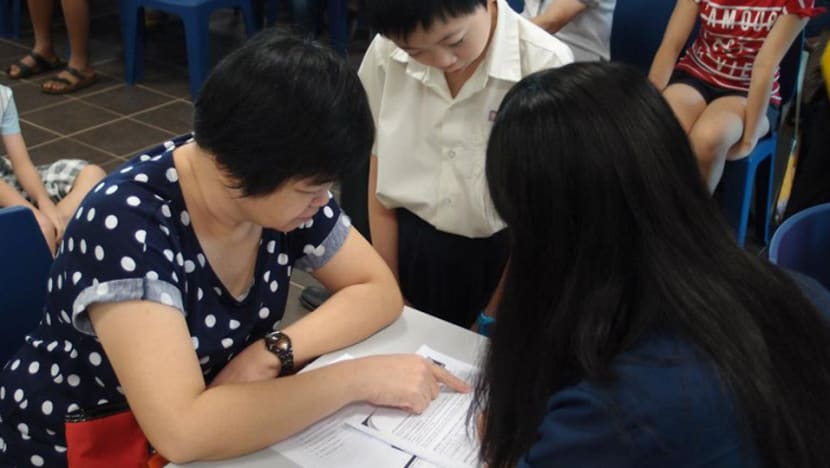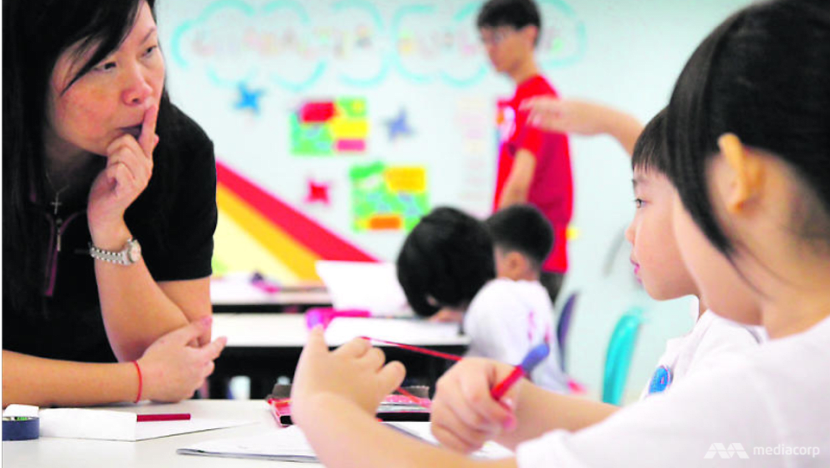commentary Commentary
Commentary: What an effective parent-teacher meeting looks like
Trepidation, anxiety, and perhaps, frustration can be common emotions displayed at parent-teacher meetings. National Institute of Education Associate Professor Jason Tan offers a different approach.

Parents and students at the Secondary 1 registration exercise at Crest Secondary School. (Photo: Crest Secondary School's Facebook page)
SINGAPORE: Schools invite parents for parent-teacher meetings (PTM) a few times each year. These meetings serve as regular forums for both sides to discuss pertinent concerns.
For most parents, schooling is a high-stakes endeavour, where many are concerned about their children’s post-secondary and career options.
It is hardly surprising then that some parents are anxious about whether their child can cope with homework and keep up with lessons. They are also eager to hear teachers say more about their child’s academic development.
There is the danger that PTMs may turn into antagonistic encounters, in which parents can become overly defensive of their children’s behaviours and what they deem as aspersions on their parenting practices. Teachers may then feel frustrated with what they see as parents’ failure to respect them as competent educational professionals.
But there is a case for optimism. The face-to-face communication may allow teachers to deepen the trust and support of parents, and give both sides opportunities to develop a more holistic approach to students’ well-being.
Through sharing a child’s classroom behaviour and learning progress with parents, teachers hope to help parents understand and take stock of their child’s development.
READ: Are you a helicopter parent? A commentary
The conversation between teachers and parents are foundational in strengthening the school’s partnership with parents and needs to continue throughout the year beyond these formal meetings – an aim that has been increasingly emphasised in Ministry of Education initiatives over the past two decades.
Since the formation of the national advisory council known as COMPASS (Community and Parents in Support of Schools) in 1998, the Ministry of Education has strengthened school-home-community partnerships and encouraged parents to support various school initiatives.
Every mainstream school now has a parent support group that facilitates parental participation in school events and contributes ideas to shape the school’s programmes.

SCHOOLING IS A SOCIAL ACTIVITY
Schooling is a very social activity. It is much more than test scores.
At school, the child co-exists within a large community. As a student, he or she has many chances to develop his or her potential beyond academics, in terms of character development and socialisation skills.
Teachers have to manage the learning needs of many students and this means ensuring that students do not develop in isolation but in tandem with being a part of a larger, cohesive and inclusive social group.
Being at school among peers and teachers is an important precursor to the working world that students will have to face as adults.
Parents may notice that their children are maturing in their social and emotional development as they participate in classroom and co-curricular activities that develop collaborative or leadership skills – and they can play a role in shaping this growth.
READ: Parents, don’t shy away from a competitive education system, a commentary
WORKING TOGETHER FOR A HOLISTIC EDUCATION
In order to contribute towards a model of holistic education, a key question PTMs might want to try to address is: “How can the home and school complement each other’s efforts to improve the child’s education journey?”
Instead of focusing on a child’s weaknesses, these parent-teacher meetings should identify and affirm a child’s strengths, which in turn may help parents support their child in developing social and emotional resilience outside the school, and navigate their environment more confidently.
For instance, teachers could point out their observations of a child’s behaviour in the classroom when he or she is given opportunities to demonstrate leadership and collaborative skills - such as when he or she leads classmates through group discussions.

READ: Protecting your kids from failure isn't helpful parenting, a commentary
Parents can use information gathered during PTMs to gauge the need for additional private tutoring and enrichment activities for their children.
The task of navigating a constantly evolving education landscpe might seem daunting to parents but let’s keep in mind, this is a two-way street.
Teachers can also use PTMs to offer sound advice to parents who at times may feel bewildered at the fact that their children are experiencing education pathways and curricula that are vastly different from those that they themselves encountered.
PARTNERING FOR THE CHILD
Contrary to what many might think, the natural relationship between teachers and parents is far from adversarial. Meetings between teaching professionals and parents can be effective in helping every child reach his or her fullest potential.
PTMs, beyond being an opportunity for teachers to engage with parents about the child’s growth and behaviour in school, also present platforms for teachers to support the child’s growth and behaviour through gaining a better understanding of their wider social context outside of school, and their behaviour across these different contexts.
Viewed with the right spirit, PTMs can be an effective tool for parents and teachers in helping both sides figure out how best to support a child’s development.
PTMs work best when both parents and teachers embrace the mindset that both parties care for the child and want to work together to help him or her learn better.
Jason Tan is an associate professor at the National Institute of Education.














